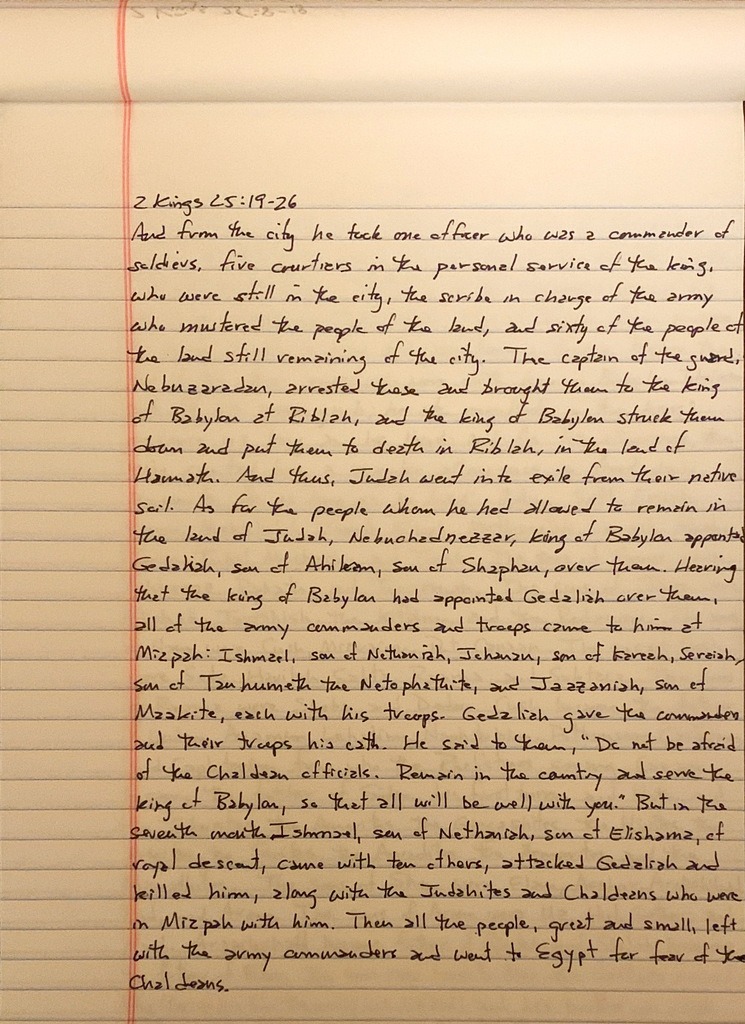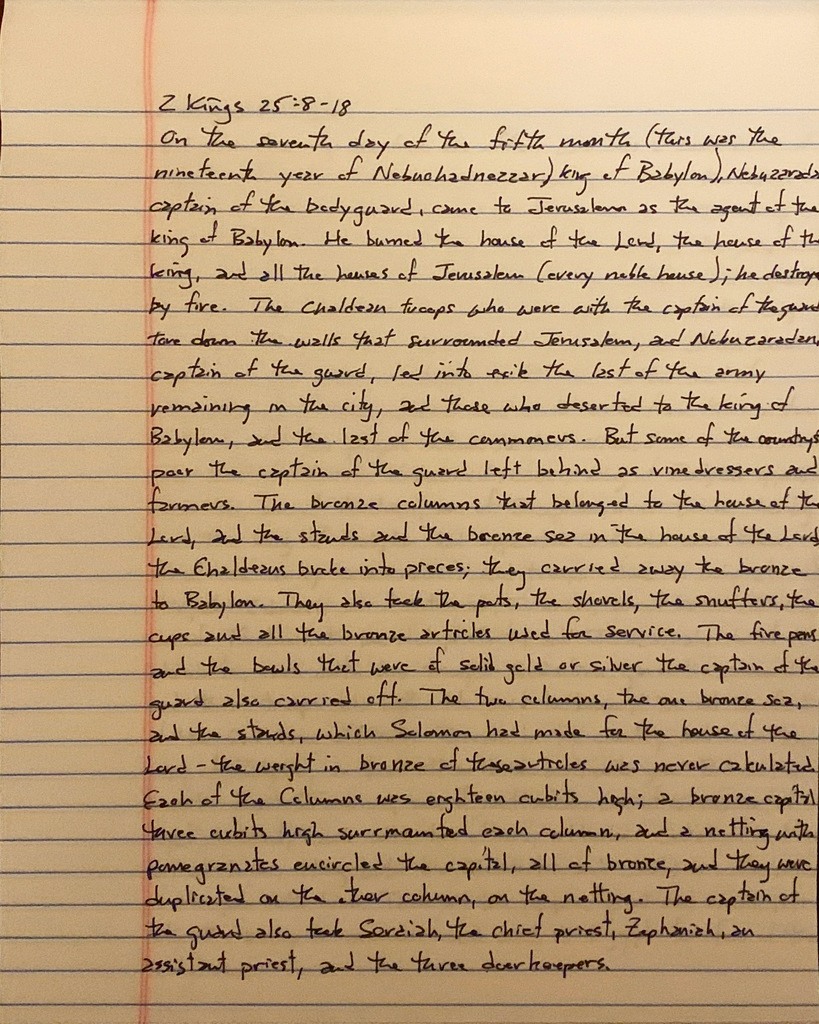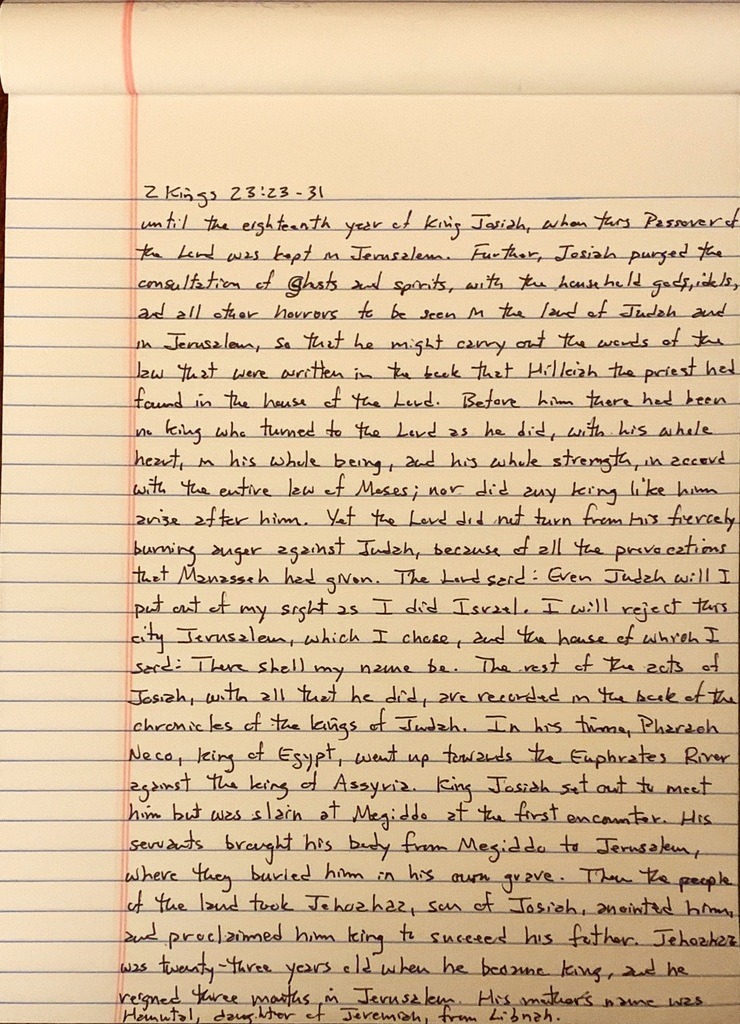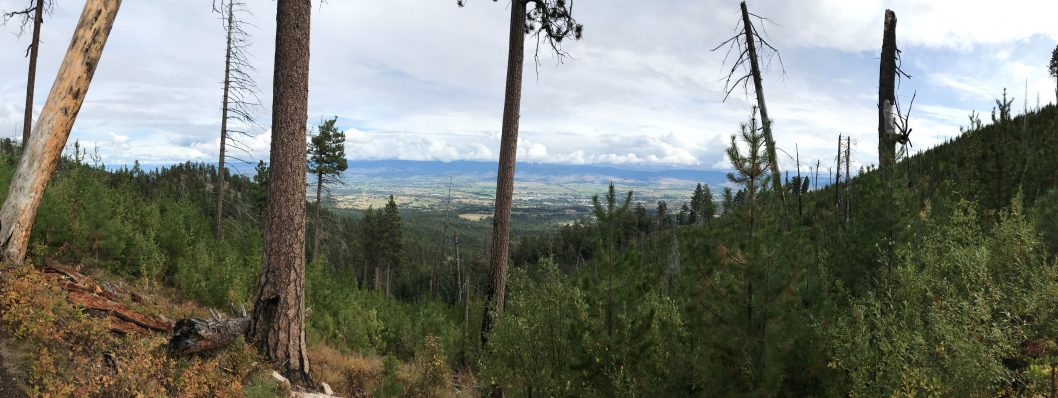- Home
- Daily Meditation
Israel Tasteless Salt

Synopsis 2Kings 25:19-26 10/30/2019
Nebuchadnezzar was the King of Babylon. He had defeated King Zedekiah of Judah and destroyed Jerusalem. After the destruction, his chief general discovered a few survivors from Zedekiah’s court. And so, he brought them to Nebuchadnezzar who was staying in the nearby town of Riblah. Nebuchadnezzar condemned these men to death.
The Babylonians appointed an Israelite named Gedaliah as the governor of the province. The Judahite officials who lived in the nearby country provinces initially agreed to serve Gedaliah. However, after seven months, one of the provincial leaders led a conspiracy of ten men. The lead conspirator was Ishmael. So, Ishmael led this group and went to Gedaliah. And they killed him.
After the assassination, most of the remaining Israelites from Judah fled to Egypt because they feared that Nebuchadnezzar might return and seek vengeance for the murder.
Israel Tasteless Salt
And so, the Israelite dynastic period ended with political intrigue and assassination. There was no reference to justice under the Law of Moses. And there was no obvious concern for the God who had brought them out of Egypt and delivered them into the promised land.
Instead, the children of Israel had become like any other people.
Tasteless Salt
This morning I remember Mother Teresa. It is reported that she once said, “Do not fear to be a contradiction.”
And I am coming to the realization that this admonition is more than just a suggestion. It is a part of my Christian identity.
“You are the salt of the earth. But if salt loses its taste, with what can it be seasoned? It is no longer good for anything but to be thrown out and trampled underfoot.” Matt 5:13
Jerusalem’s Destruction

Synopsis 2Kings 25:8-18 10/29/2019
King Nebuchadnezzar of Babylon besieged Jerusalem. So, in an effort to escape, King Zedekiah attempted fled the city. However, Chaldean soldiers apprehended him. And Nebuchadnezzar tortured and imprisoned him.
After this, Nebuchadnezzar sent his forces to utterly destroy the city. So, the Babylonians burned the temple and the king’s palace along with other major buildings. They took everything of value from the city, especially the precious metals that had been used to build and equip Solomon’s temple.
And then they deported the rest of the people, including the high priest and other temple ministers.
Jerusalem’s Complete Destruction
Jerusalem was completely destroyed. The Babylonians had torn down the protective walls of the city. And, they burned and looted the temple and palace. Additionally, they led the remaining officials away to exile in Babylon.
All seemed lost.
Ashes Before “Beauty From Ashes”
There has to be ashes before there can be “beauty from ashes”. And everyone who follows in the Way of Christ will eventually have to give up their own way of self-service.
The spirit of the Lord GOD is upon me, because the LORD has anointed me; He has sent me to bring good news to the afflicted, to bind up the brokenhearted, To proclaim liberty to the captives, release to the prisoners, To announce a year of favor from the LORD and a day of vindication by our God; To comfort all who mourn; to place on those who mourn in Zion a diadem instead of ashes, To give them oil of gladness instead of mourning, a glorious mantle instead of a faint spirit.” Isa 61:1-3
The Crunch of Empires

Synopsis 2Kings 24:6-15 10/24/2019
King Jehoiakim died. After this, Jehoiachin became king. Jehoiachin was Jehoiakim’s son. And he was only eighteen years old when he became king.
At the time of his Jehoiachin’s coronation, King Nebuchadnezzar’s power was increasing. So much so that the Babylonian empire had completely eclipsed Egypt’s empire.
So, almost immediately after Jehoiachin became king, Babylon again attacked Jerusalem. After they besieged the city, Jehoiachin surrendered to Nebuchadnezzar. As a result, he and his family were deported to Babylon, along with his high officials and most of the wealth of the city. This was the first deportation.
The Crunch of Empires
By the time of Jehoiakim and Jehoiachin, the kingdom of Israel was limited to the territory associated with the tribe of Judah. So, it was a small kingdom. But, it was strategically positioned between three empires. In the past, the region was dominated by either Egypt or the Assyrian Empire. Assyria was northeast of Israel and Egypt’s empire was situated to the south.
Because of this, the kings of Judah historically attempted to use its strategic geographic location to remain independent of either empire. However, as the Babylonian empire began its dramatic rise, it subsumed the Assyrian empire and pressed right up to the boundary of Egypt. And this included the territory of Israel.
So, the Israelite effort to remain an important political territory and also maintain their independence proved to be impossible. Their efforts to remain independent in the context of Babylon’s raw military conquest and Egypt’s political intrigue had failed. But the greatest calamity was that their special relationship as God’s chosen people was ultimately threatened and all but lost as the people were deported to Babylon.
The preeminence of this relationship would only be restored when the surviving children of Israel were stripped of everything else.
The Crunch of Culture
Though I’m not a nation, it doesn’t feel very different for me. I call myself a child of God. But I so often find myself drawn into the stuff of earth. I gorge on the news of the day. I feel the need to have an opinion about everything and anything. And somehow my engagement with the world becomes less about creating value for others and more about my pride – and protecting my place in this world.
It is the faithfulness of God that strips away the worthless and the nonsensical. But being stripped is being stripped. Anything I cling to makes the process more painful. Everything I cling to makes the process more painful.
Better to lay this down.
…”At that he said to them, “Then repay to Caesar what belongs to Caesar and to God what belongs to God.” Matt 22:21
Jerusalem Beyond Redemption

Synopsis 2Kings 23:23-31 10/22/2019
King Josiah of Judah was unlike any king who had come before him. Upon hearing the Law of Moses read, he repented entirely. And then, he thoroughly purged the land from the abuses of wrong worship, idolatry and witchcraft.
Even so, God’s wrath was reportedly unabated. The scripture notes that the Lord still intended to reject Jerusalem.
In time, Josiah died in battle at Megiddo. Afterward, his servants took his body to Jerusalem and buried him with his ancestors.
Jehoahaz was Josiah’s son. So, the people named him the next king over Judah. However, he reigned for only three months.
Jerusalem Beyond Redemption
Despite all of Josiah’s efforts to purge the land of inequity, God had determined Jerusalem’s fate. The city itself had become a stumbling block to God’s plan. And so, the city had to be destroyed.
Circumstances Beyond Redemption
When I do what I know is wrong AND I know there is no possibility that it could not be wrong, that behavior is beyond redemption.
For example, the act of premeditated murder is beyond redemption. And while even this doesn’t mean that someone who commits premeditated murder is beyond redemption, the act remains irredeemable. This act can never be really good under any circumstances. It can only bring death.
So, knowing this, it’s curious to me how often I still struggle to let go of things that I know are essentially wrong. Though I am clearly overweight, I always eat the plate clean wanting to believe that it is a “sin to waste food”. But no amount of justification can redeem my bad habits. And, in this sense, my habit of overeating cannot be redeemed.
So I’m slowly learning that it’s time for me to be more decisive and leave unworthy things behind.
“If anyone sees his brother sinning, if the sin is not deadly, he should pray to God and he will give him life. This is only for those whose sin is not deadly. There is such a thing as deadly sin, about which I do not say that you should pray.” 1John 5:16
Josiah’s Reparticipation

Synopsis 2Kings 23:15-22 10/21/2019
Josiah was king over Judah when the high priest rediscovered the book of the Law of Moses. Upon hearing an oral reading of the book, the king was so convicted by the law that he began to cleanse all of the nation from idol worship.
So, once he had destroyed all the high places and other idol-worshiping practices in Judah, he went outside the kingdom. He led his forces to Bethel, which was located in the traditional region of Ephraim. And there, he destroyed the original false worship location that had been erected by King Jeroboam, the first king of the divided northern kingdom. He even desecrated the site by spreading the bones of the dead on the site so that it could never again been used for worship and sacrifice.
After this, he returned to Jerusalem. And there, he decreed that the people should observe the Passover that was prescribed in the book of the law. And so, the people celebrated the Passover in a way that had not been observed since before the time of the of Judges
Josiah’s Re-participation
Josiah realized the extent of the calamity. The people had so forgotten God that they misplaced the book that Moses had written. They had forgotten what God had done for them. And they had forgotten the covenant manner in which God could freely bless them.
For his part, Josiah realized that this failure was the root cause of their many problems. And, although the Law of Moses was filled with myriad statutes that the people had ignored over the years, he honed in on the Passover. Above all else, the Israelites had failed to keep the Passover. And the Passover was the singular feast designed primarily for remembering and re-experiencing.
Re-participation in Christ
Memory is good for reflection. As I reflect on what has been in my life, my memories help to give context and illuminate the meaning of my experiences.
But re-experiencing is different. Instead of merely remembering, it is participating.
The Passover was more than memorializing the exodus from Egypt. The Passover is an actual participation in the bitterness of slavery through the eating of bitter herbs. And Passover is more than remembering that the first-born of Egypt had died. Instead it is an actual participation in the blood of a lamb that brought a night of salvation and freedom.
Jesus is likewise but more so. In the Eucharist, I am called to remember. And I’m encouraged to never forget. But even more than the prompting of my memory to give context and meaning, it is a call to participation.
In the Eucharist, I am joined to the moment of Christ’s salvation. No memory touches this.
It is perhaps a paradox that I find participation in something as seemingly ordinary as eating and drinking. And yet, experiencing and re-experiencing are bodily acts necessary for an essentially bodily, kind of being. And I am a bodily kind of being.
Accordingly, I come to this experience recognizing that I was called beyond the capacity of my memory to a cosmic and transcendent moment of encounter.
“The cup of blessing that we bless, is it not a participation in the blood of Christ? The bread that we break, is it not a participation in the body of Christ?” 1Cor 10:16
Josiah Burned Bridges

Synopsis 2Kings 23:6-14 10/18/2019
After hearing the Law of Moses read for the first time, King Josiah cleansed the land of idol worship. Accordingly, he completely removed any vestige of idol worship from Solomon’s Temple. And he destroyed the false idols in Jerusalem.
After this, he prevented the priests who practiced in the countryside from making offerings in the places where they came from. Instead, he brought them to Jerusalem and made provision for them there.
However, he executed priests who served false gods. And all the places where people worshiped false gods were destroyed. And he even directed his forces to desecrate the locations so that they could not be easily reestablished.
Josiah Burned Bridges
Josiah destroyed idol worship in Judah. And he did it in a way that prevented the practices from reemerging during his lifetime. When he acted, he did so with absolute determination. For him, cleansing the nation of false worship was a total commitment.
Burning My Bridges
Sometimes the decision to move forward means that I can never go back.
I came to be an adult Catholic after reading the life of St. Francis of Assisi. He was, I think, like Josiah. Of course, the two men were not alike in the use of violence and destruction. But what they certainly have in common is total commitment. For, they both answered the call of Christ with total abandon. When each man heard their respective call, they burned every bridge back to their former ways of life.
So, I find myself asking; what about my life is at odds with the call of Christ? And could I put aside my fears? Could I permanently leave everything else in order to be totally abandoned to that one thing that He intends to work through me?
Of course, the answer is yes – I could do this. In a way appropriate to my circumstances and call, I could put everything else down.
But, will I? Will I – like Francis or Josiah? As it is written, “For all creation waits in eager anticipation to see the revealing of the sons of God.” (Rom 8:19)
All creation waits to see what you and I will do.
“The Lord GOD is my help, therefore I am not disgraced; Therefore I have set my face like flint, knowing that I shall not be put to shame.” Isa 50:7
Josiah Cleansed the Temple

Synopsis 2Kings 22:19-23:5 10/17/2019
Josiah’s officials received the prophecy from Huldah the prophetess. And so, they returned to King Josiah and reported what she had said to him.
Huldah explained that the people of Judah and Jerusalem had stirred up God’s wrath through their disobedience. What’s more, this wrath would result in the destruction of Jerusalem. However, because of Josiah’s lament for the sins of the nation, the prophetess assured him that the prophecy would not come during his lifetime.
Josiah’s reaction was swift. First, he called both the tribal leaders and the leaders of the city of Jerusalem together. Then, he led them to the temple. And there, he made a renewing covenant with God. He committed himself and the people to returning to the Law of Moses. And he promised to love God alone with his whole heart and soul.
After this, he directed the cleansing of the temple from all idols. But he didn’t simply remove the idols. Instead, he ordered them to be burned and pulverized.
Josiah Cleansed the Temple
From the law, King Josiah recognized how much idolatry offended God. So, the king cleansed the temple from the idols that his father, grandfather and other kings had deposited there over the generations. His intention was to stop provoking God to wrath.
Cleansing My Own Temple
In his earthly ministry, Jesus also cleansed the temple. But when He performed His cleansing, His intention was focused on removing the pervasive greed of money changers and sellers of sacrificial animals.
In that time, the problem was that they had objectified God for the purpose of making money. The temple merchants made exorbitant profits by taking advantage of people trying to fulfill the Law of Moses.
As a result, we talk about the love of money as a form of idolatry. It is seen as an idol because it competes for the affection of the people. In the case of money changers, it competed for affection in the very place where all affection should be directed toward God.
I am a created being. In fact, I was made to know and love God. And in this sense, my heart is a temple of God. So, to be rightly ordered as a temple, my affections should be for God alone. Ultimately, anything resident in my heart that distracts or competes for my affection, functions as an idol.
None of this is intended to suggest that I shouldn’t feel affection for others. But it does suggest that every other affection must finds its place in the light of this singular, primary good.
“Therefore, you shall love the LORD, your God, with your whole heart, and with your whole being, and with your whole strength.” Deut 6:5
Josiah Seeking God

Synopsis 2Kings 22:9-18 10/16/2019
King Josiah’s officials informed him that they had discovered a book in the temple. And so, he directed them to read the book. As they did, the king became aware of the Law of Moses. What’s more, he suddenly realized how much the people had strayed away from the One, True God.
Accordingly, Josiah tore his garments as a lament. And he directed his officials to seek out someone who could interpret the Lord’s will for the nation.
So, the officials went to a prophet named Huldah. She informed the officials that God’s unquenchable wrath was determined to destroy Jerusalem because of the Israelites’ unfaithfulness. Still, the Lord had noted King Josiah’s response to the revelation of the Law of Moses. And so, Josiah could expect mercy in his lifetime.
Josiah Seeking God
It was a shock. King Josiah thought he was doing well and right. And then, out of nowhere comes the revelation that he, and everyone he knew, had betrayed the God of Abraham, Isaac, Jacob and Moses.
But for Josiah, the critical aspect of this moment was his response. And he responded well. He didn’t slip into condemnation. Instead, he recognized the failure and lamented his part. And this positioned him to take the next step in repentance.
Seeking God After Sin
Sin is the failure to enter into the possibility of a moment. It happens when I choose to be less than I ought to be. It happens when I choose to do less than I ought to do.
My sins are dreadful. And my experience shows me that there is no avoiding this sentiment.
So, when I sin it’s only a matter of time before I become aware of the ugliness of my failings. And this is painful. My moral failings bring real pain. And so, it follows that the sentiment isn’t wrong.
But what is wrong is my sense of condemnation. This alone compounds every sin. It always makes things unnecessarily worse.
What I need is a heart of repentance. What I need is to make the commitment to change – to be changed.
“Produce good fruit as evidence of your repentance” Matt 3:8
Josiah’s Hidden Treasure

Synopsis 2Kings 21:22-23:8 10/15/2019
King Manasseh died. After his death, his son Amon became king. And he reigned for two years.
But, King Amon committed the same kind of evil as his father Manasseh. He worshipped idols. And, he led the people into sin. So, after two years, he was assassinated. But then common people rose up against the assassins and killed them.
Later, the people made Amon’s son Josiah king over Judah. But, Josiah was only eight years old when he became king. Even so, he successfully reigned for thirty-one years.
Now, Josiah was remembered for this faithfulness to God. But, even before his faithfulness was manifest, he appears to have been a diligent man who focused his attention on maintaining the temple and the city is good condition. And, this was his disposition even though he had been raised in near complete ignorance of the law of Moses.
Curiously, as a result of his own commitment to proper building maintenance, the book of the law was rediscovered. For, it had been hidden away in the temple. But no one had actually read it for generations.
Josiah’s Hidden Treasure
King Josiah had a natural heart for order and excellence. Unbeknownst to him, these are essential elements of a natural heart for God. Still, in this first ten year period of his reign, he was totally ignorant of the law of Moses.
So, it’s an incredible irony. In effect, he was totally unaware of the hidden treasure that was literally, only a few yards from the palace where he lived. And yet he intuitively knew enough that the temple should be maintained in good repair and that the people ministering at the temple should be fairly treated.
God the Inexhaustible Treasure
As much as I sometimes think I know God, I still find that I’m regularly brought to an awareness of my own ignorance. And yet, this is no cause for embarrassment or shame.
My experience is that God is always so much better than I imagine Him to be. So, knowing God is like constantly being surprised. Neither my affections nor my intellect ever fully comprehend this extraordinary person.
And so, the hopeful joy I have for the future is the possibility of contemplating the inexhaustible character of God for all eternity.
“To me, the very least of all the holy ones, this grace was given, to preach to the Gentiles the inscrutable riches of Christ” Eph 3:8
Manasseh Normalized Evil

Synopsis 2Kings 21:9-21 10/14/2019
God was vexed with the tribal nation of Judah. His purposes were frustrated because King Manasseh did not follow in the ways of Moses. Additionally, by his scandalous behavior, Manasseh led many of the people astray.
God expressed this frustration by recounting many examples of Israel’s past faithlessness beginning from the time of Moses.
Eventually, King Manasseh died. And so, his son became king. The son was named Amon. He was twenty-two years old when he ascended the throne. And then, Amon reigned for two years as king.
However, Amon did the same kind of evil as his father had done before him.
Manasseh Normalized Evil
Manasseh did what was evil. And he lived a long time. So, after a while, the evil that he regularly and habitually did became normal.
At one point in time, placing an idol in the temple of the Lord would have elicited shock. And it may very well have resulted in bloodshed against the perpetrator. But with King Manasseh, the shock eventually wore off. And at this point, it just became normal.
What was evil had become normalized.
When Evil Becomes the Norm
When evil behavior becomes normal, what’s obvious to the casual observer suddenly becomes imperceptible.
So, if behavior and the ability to understand are so closely related, then it follows that faithfulness is actually the perquisite to understanding.
If I persistently refuse to obey then I can expect only ignorance and half-truth.
But if I persistently chose God’s will, then I will eventually learn God’s ways.
“Gross is the heart of this people, they will hardly hear with their ears, they have closed their eyes, lest they see with their eyes and hear with their ears and understand with their heart and be converted, and I heal them” Matt 1:15










